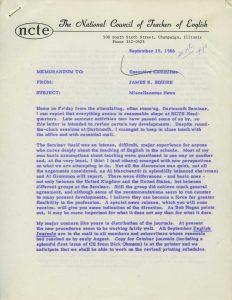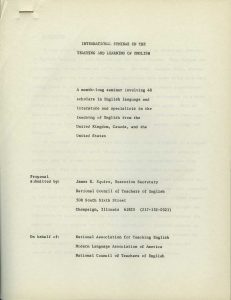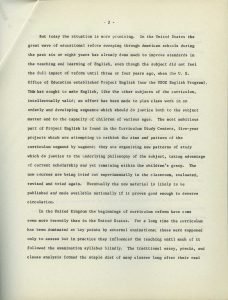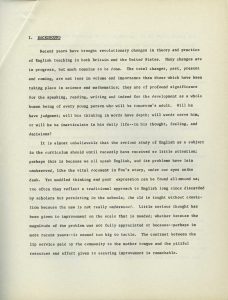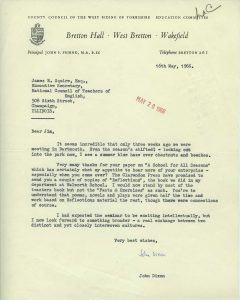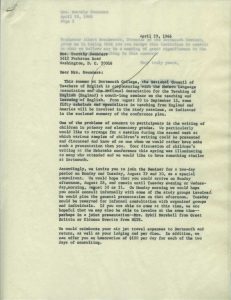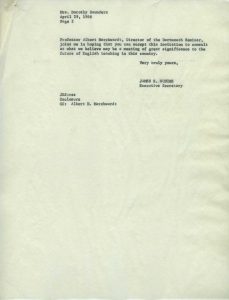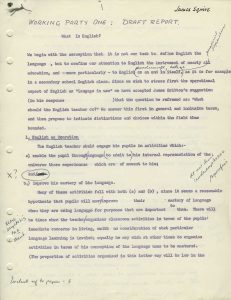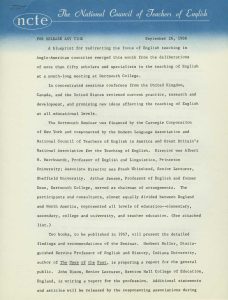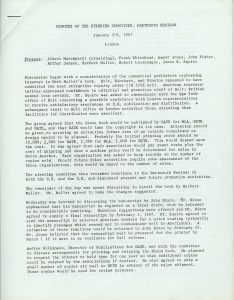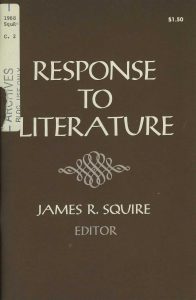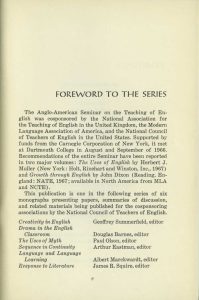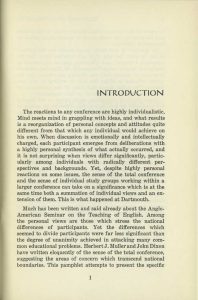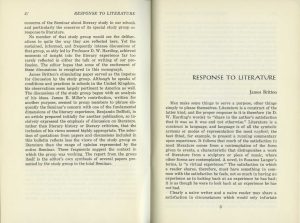“The [Dartmouth] Seminar was an intense, difficult, major experience for anyone who cares deeply about the teaching of English in the schools. Most of my basic assumptions about teaching were questioned in one way or another, and, at the very least, I think I (and others) emerged with new perspectives.”
James Squire in memorandum to Executive Committee (1966)
“What is English?” From August 20 to September 15 in 1966, more than fifty teachers from Britain, Canada, and the United States convened to answer this question and many more on the fundamentals of English at the Anglo-American Seminar on the Teaching of English, more commonly known as the Dartmouth Seminar. Sponsoring the seminar with the National Association for the Teaching of English (NATE) and the Modern Language Association (MLA), NCTE had many of its members participate in the discussion, including Executive Director James Squire. The purpose of the seminar was not only to define the basics of English but to also share teaching strategies in the hopes of devising new ideas to change English curriculums for the better.
Indeed, it was found that a wide gap existed between British and American schools of thought regarding the English curriculum. In “A Long Way Together: A Personal View of NCTE’s First Sixty-Seven Years,” J.N. Hook described the conflict between the two: “In many British schools, the Americans found, no written curriculum existed, or at best, a list of literary works to be read sometime during the year; the sometimes massive curriculum volumes of some American schools appalled the British, who preferred spontaneity” (1979, p. 220). Despite these differences, teachers at the Conference were able to reach agreements on some key issues, including the ultimate goal of English teaching, which was determined to be for the personal growth of each student (p. 221).
After the seminar, books and journal articles were published based on what was discussed at Dartmouth, including Growth Through English, by John Dixon, and the series, the Dartmouth Seminar Papers. The opinion of whether the seminar had a lasting influence on the English curriculum varies among English scholars, according to Joseph Harris. In his article “After Dartmouth: Growth and Conflict in English” published in College English, Harris summarized how English teachers with a positive perspective regarded the seminar: “Dartmouth has symbolized a kind of Copernican shift from a view of English as something one learns about to a sense of it as something one does” (1991, p. 631).
Harris argued that in reality, however, “the Dartmouth ideas seem to have failed to have much practical effect on what actually goes on in many English classrooms. Rather, the day-to-day work of most teachers, in both America and Britain, from preschool to the university, seems to have continued on after Dartmouth much as it had before — marching lockstep to the demands of fixed school curriculums, standardized tests, and calls for improved skills and increased cultural unity.” That was not to say that Dartmouth did not have any effect. Dartmouth “continue[s] to shape the kinds of talk about teaching that go[es] on at conferences and in journals,” Harris wrote (p. 632). To learn more about the Dartmouth Seminar and its origin, organization and influence, take a look at the featured topics below:
- Memorandum Post-Seminar
- Proposal for the “International Seminar on the Teaching and Learning of English”
- Pre-Seminar Work
- Post-Seminar Work
- Dartmouth Seminar Papers Series
Memorandum Post-Seminar
In this memorandum to the Executive Board, James Squire reflected happily on his experience at the Dartmouth Seminar: “Home on Friday from the stimulating, often stunning, Dartmouth Seminar, I can report that everything sees in reasonable shape at NCTE Headquarters.” Along with being one of the principle organizers of the Dartmouth Seminar, Squire was a part of Dartmouth’s first working party to draft “What is English?”, and he was also the editor of the first book in the Dartmouth Seminar Papers series, Response to Literature. Learn more: 15/70/005
Item: Memorandum (September 19, 1966)
A Proposal
To make the seminar a reality, Squire wrote the proposal for its funding on behalf of MLA, NATE, and NCTE. Originally called the “International Seminar on the Teaching and Learning of English,” the seminar was meant to bridge the gap between English and the hard sciences, which have already been the subject of serious reform. Squire wrote, “It is almost unbelievable that the serious study of English as a subject in the curriculum should until recently received so little attention.” The Carnegie Corporation ultimately financed the Dartmouth Seminar in full. Learn more: 15/74/001
Item: Proposal, “International Seminar on the Teaching and Learning of English”(c., 1966)
Pre-seminar Work
With the seminar funded, Squire then worked with inviting scholars, teachers, and consultants, identifying what kind of expertise was needed for the seminar to be a success and who was a likely candidate with the necessary knowledge. In organizing the seminar, one colleague that Squire worked closely with was John Dixon, a British teacher who would later publish Growth through English. Learn more: 15/74/001
Item: Proposal, “International Seminar on the Teaching and Learning of English”(c. 1966)
Post-seminar Work
At the seminar itself, participants were divided into working groups. James Squire was in working party one, which tackled the question: “What is English?” Once the seminar was over, however, the work did not stop. NCTE, NATE, and MLA sought to publish their works. A press release dated just eleven days after the seminar announced that two books were to be published about Dartmouth, which would be written by Herbert Muller (The Uses of English) and John Dixon (Growth through English). In January of 1967, the minutes of the Steering Committee of the Dartmouth Seminar revealed the nearly complete plans for publishing. Learn more: 15/74/001
Item: Proposal, “International Seminar on the Teaching and Learning of English”(c. 1966)
Dartmouth Seminar Papers Series
Besides Growth through English by John Dixon, the Seminar also inspired the series, the Dartmouth Seminar Papers, which summarized the papers and discussions covered during the Seminar. Titles in this series include, Creativity in English, by Geoffrey Summerfield, Drama in the English Classroom, by Douglas Barnes, The Uses of Myth, by Paul A. Olson, Sequence in Continuity, by Arthur Eastman, Language and Language Learning, by Albert H. Marckwardt, and Response to Literature, by James R. Squire. Learn more: 15/71/820
Item: Copy of Response to Literature (1968)
